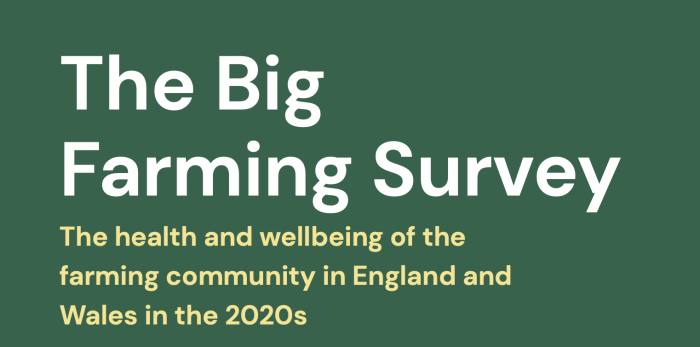The pig farming sector suffers more than any other from mental health problems, according the findings of a major piece of research by the Royal Agricultural Benevolent Institute (RABI), writes Meghan Taylor.
RABI announced the results of its Big Farming Survey in Birmingham on October 14. It set out to investigate the health and wellbeing of the farming community in England and Wales in the 2020s; with data from over 15,000 responses to questions answered by people who work across the various farming and agricultural sectors.
The survey found that over a third (36%) of the farming community stated that they are probably or possibly depressed. Data showed that depression rates varied across different farming sectors.
In the specialist pig sector 47% of the survey respondents noted that they were either probably or possibly depressed – the highest figure in the survey, and particularly significant considering the current pig industry crisis. The next most affected sectors were LFA (upland) grazing and dairy (both 39%).
The farming community were asked to comment on their anxiety levels, which resulted in almost half of the farming community (47%) indicating that they were experiencing either mild, moderate, or severe anxiety. Furthermore, figures again showed that those in the specialist pig farming, dairy, and LFA grazing livestock sectors were the most likely to experience moderate or severe anxiety.
The survey found 43% of women are possibly or probably depressed, compared with 33% of men. In addition, over one half of women (58%) experience mild, moderate or severe anxiety, compared to 44% of men. It found loneliness to be a big problem in farming, particularly in younger people.
The results of the Big Farming survey have put a spotlight on how the current crisis is affecting the mental health and wellbeing of those who work in the pig sector. As Brexit and Covid-19 visa restrictions have led to labour shortages in abattoirs across the UK, pig farmers are struggling with a backlog of pigs, resulting in welfare issues on farms and increasing financial pressures on farmers.
Stress factors
This increasing number of stresses on pig farmers was also evident in the survey. The specialist pig sector, according to the average number of stress factors, by farming sector, ranked the highest with an average of 6.4, again slightly above upland grazing and contrasting with the 4.3 stress factors reported at the other end of the scale by poultry farmers.
For pig, dairy and mixed farming people, the most significant stressor was regulation, compliance and inspection, which came out top across the sectors, highlighted by 45% of respondents.
The Covid-19 pandemic was registered in the survey as the second highest cause of stress for the farming community, with loss of subsidies/future trade deals came fourth at 40%. Financial pressures were not rated as highly at 31%.
RABI’s survey analysis shows that leisure time away from work is an essential buffer from work-related stress, and 45% of respondents said that on average they did leave the farm for leisure purposes at least once a week. However, RABI also noted that leisure time is not always an option for some, and almost a third (29%) of the farming community stated that they hardly ever or never leave the farm. It’s apparent that in the current pig industry, as pig farmers continue to be understaffed and thus overworked, leisure time seems a decreasingly viable option for many of the farmers and farm workers.
However, whilst the survey has revealed that many people within the farming community are facing significant mental and physical health challenges, 50% of respondents remain optimistic about the future of their farming businesses.
Targeted response
Suzy Deeley, the corporate partnership manager for RABI, said that considering the results, ‘there is a huge amount of work going on behind the scenes at RABI to initiate a targeted and appropriate response in partnership with key partner organisations’.
Ms Deeley said that RABI was ‘hugely grateful to all the delegates who attended the survey’s launch and for their valuable contribution to these important discussions’. “We have demonstrated that there is a real appetite to work together to address the challenges facing farmers,” she said.
Matt Lobley, professor of rural resource management at the University of Exeter and research lead, said: “The Big Farming Survey has given far greater insight into the realities of life on the farm, and there is now a unique opportunity to build on the findings which have been presented.”
He identified several key stats that the industry must respond to, including figures such as the high number (58%) of women in the farming community that are experiencing mild, moderate or severe anxiety, 52% of the whole community experience pain and discomfort, and 59% of survey respondents believe their business is viable over the next five years.
RABI will be launching pilots of three new support schemes: an accredited, bespoke farming mental health first aid training service, access to in-person mental health support, and further trials of RABI’s Community Pillars initiative.




